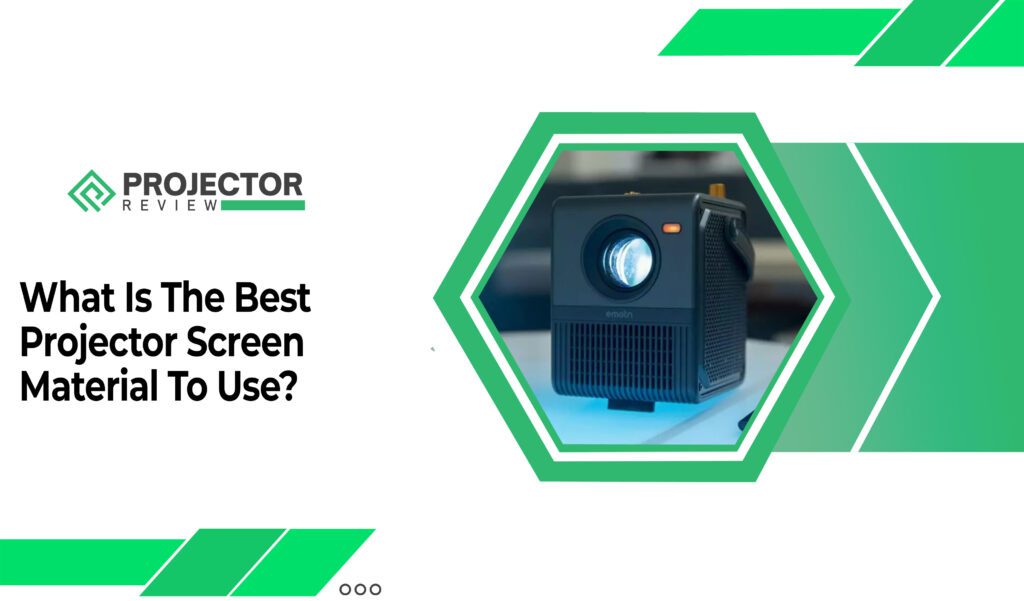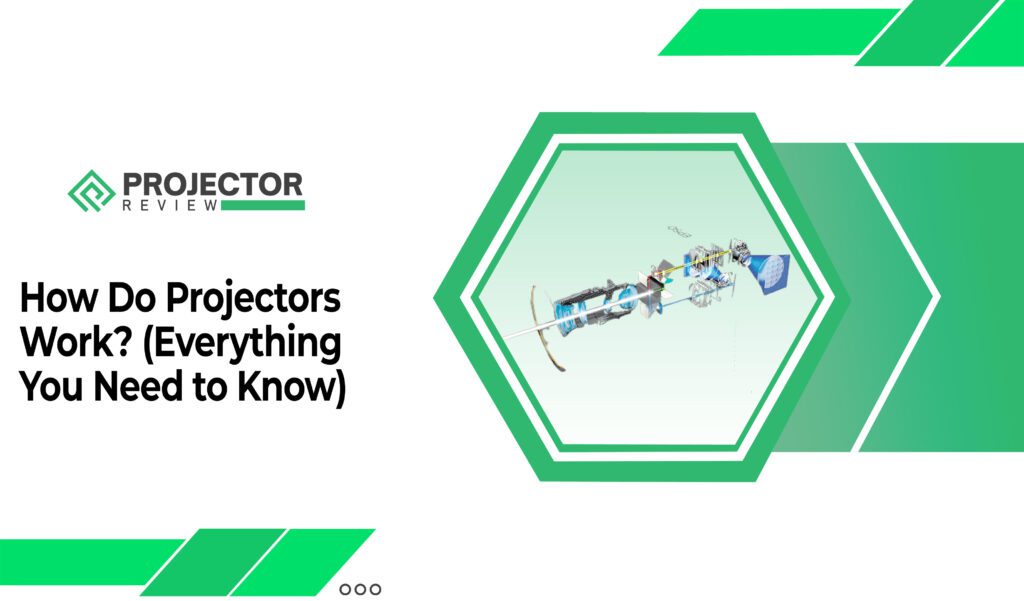In a world dominated by digital displays, concerns for eye health have taken center stage. The uncountable use of screens, ranging from smartphones to computer monitors, has led many to question the impact of prolonged exposure on our precious visual faculties.
Are you also worried about eye health care and other disabilities in children and elders because of the extra use of screen areas or projectors and want to find the answer to “Are projectors better for your eyes?”
As we start this exploration, we found the effects of display technology and its potential effects on ocular well-being with easy ways how to hang a projector screen. The distinct qualities of projectors, such as their larger image sizes and reduced blue light emission, raise intriguing possibilities for reducing eye strain and fatigue.
By focusing on the science behind visual comfort and examining the ergonomic aspects of projector usage, we aim to shed light on whether projectors truly stand as a gentler option for our eyes in the modern digital age.
Let’s find the projector’s effects, reasons, and recovery methods!
Is a Projector better than a TV?
You must know how many watts a projector uses to choose the right one. Let’s explore the professional perspective advantages on whether a projector is better than a TV, focusing on key points:
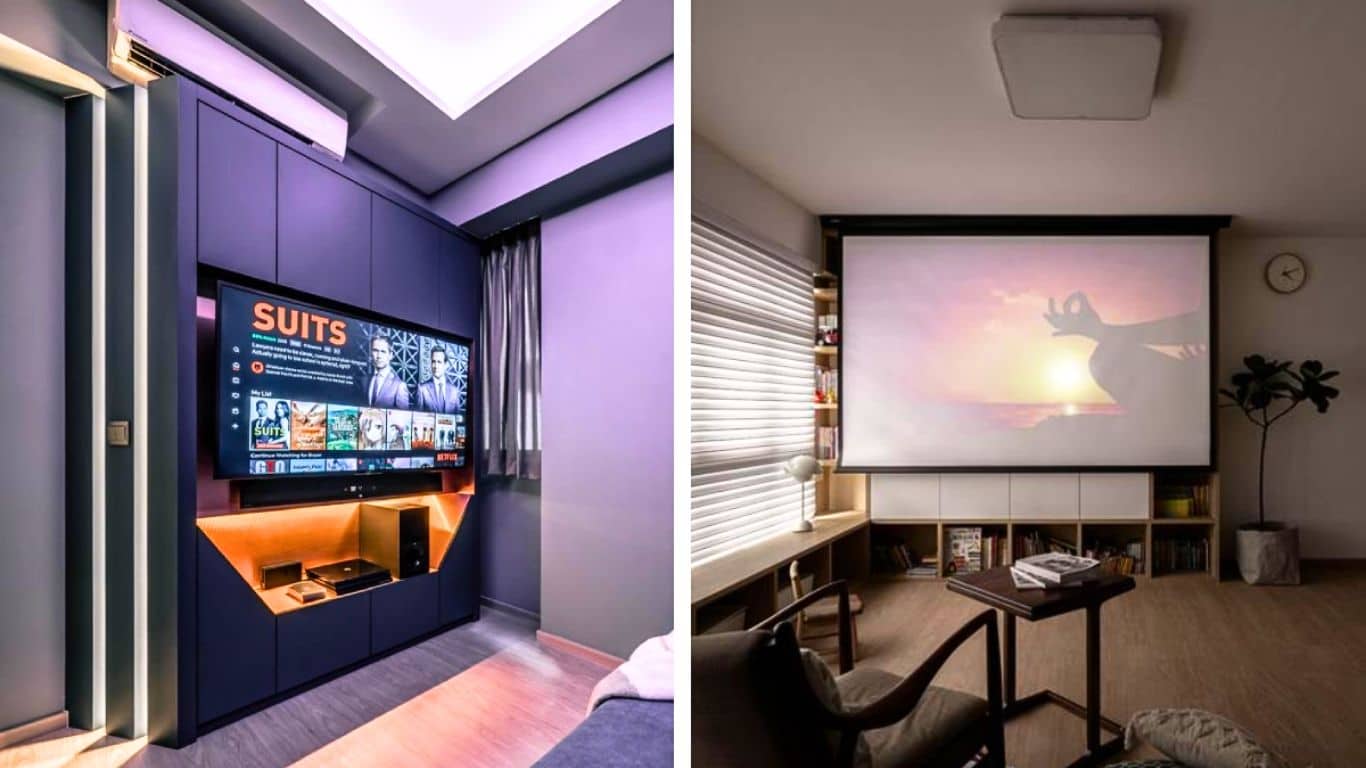

Screen Size and Immersion
Projectors offer larger screen sizes compared to TVs, enhancing the immersive experience. This is particularly advantageous for presentations, home theaters, and gaming setups, providing a cinematic feel that a TV might struggle to replicate.
Flexibility in Screen Size
Projectors provide flexibility in adjusting screen size according to the available space, making them suitable for various environments. They can create massive images without the physical constraints of a large TV.
Space Efficiency
Projectors save physical space as they don’t require a dedicated stand or wall space. They can be ceiling-mounted or placed discreetly on furniture, making them ideal for compact living spaces.
Portability
Portable projectors are available, allowing presentations or entertainment to be taken outside the confines of a room. This mobility is beneficial for business meetings, outdoor movie nights, or educational purposes.
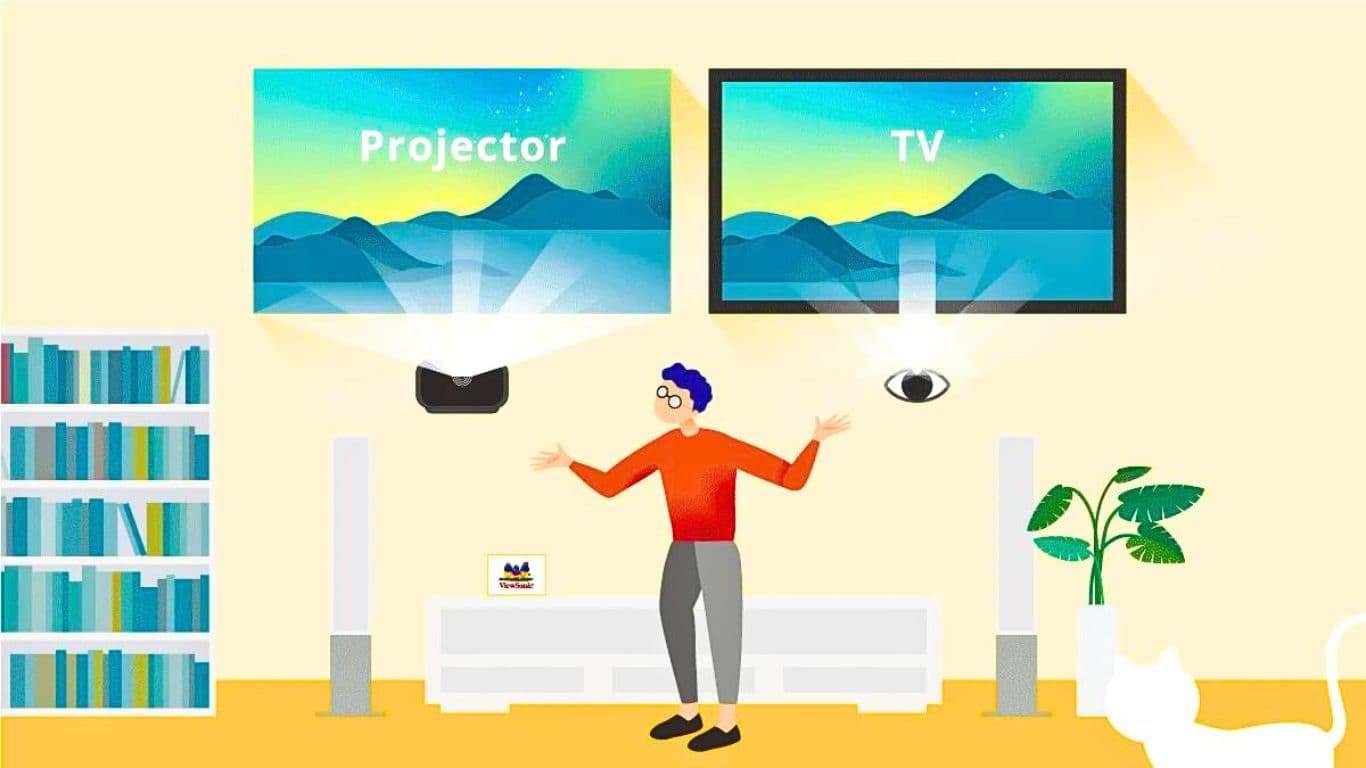

Ambient Light Considerations
Projectors can handle ambient light better than many TVs, as they project images on a screen rather than emitting light directly. This makes them suitable for rooms with windows or varying light conditions.
Cost-Effectiveness
Projectors often offer better value per inch of screen size compared to large TVs. They can deliver a theater-like experience without the exorbitant cost of a gigantic TV.
Customization
Projectors offer keystone correction and lens shift features, enabling precise image alignment and distortion correction, which can be crucial for professional presentations or installations. It decides how long projectors last.
Longevity
Projector lamps typically have longer life spans than OLED TVs, translating to potentially lower long-term maintenance costs.
Can a Projector light Damage your Eyes?
Yes, prolonged exposure to projector light can potentially damage your eyes, similar to other sources of bright light. Here’s an explanation of how this can occur:
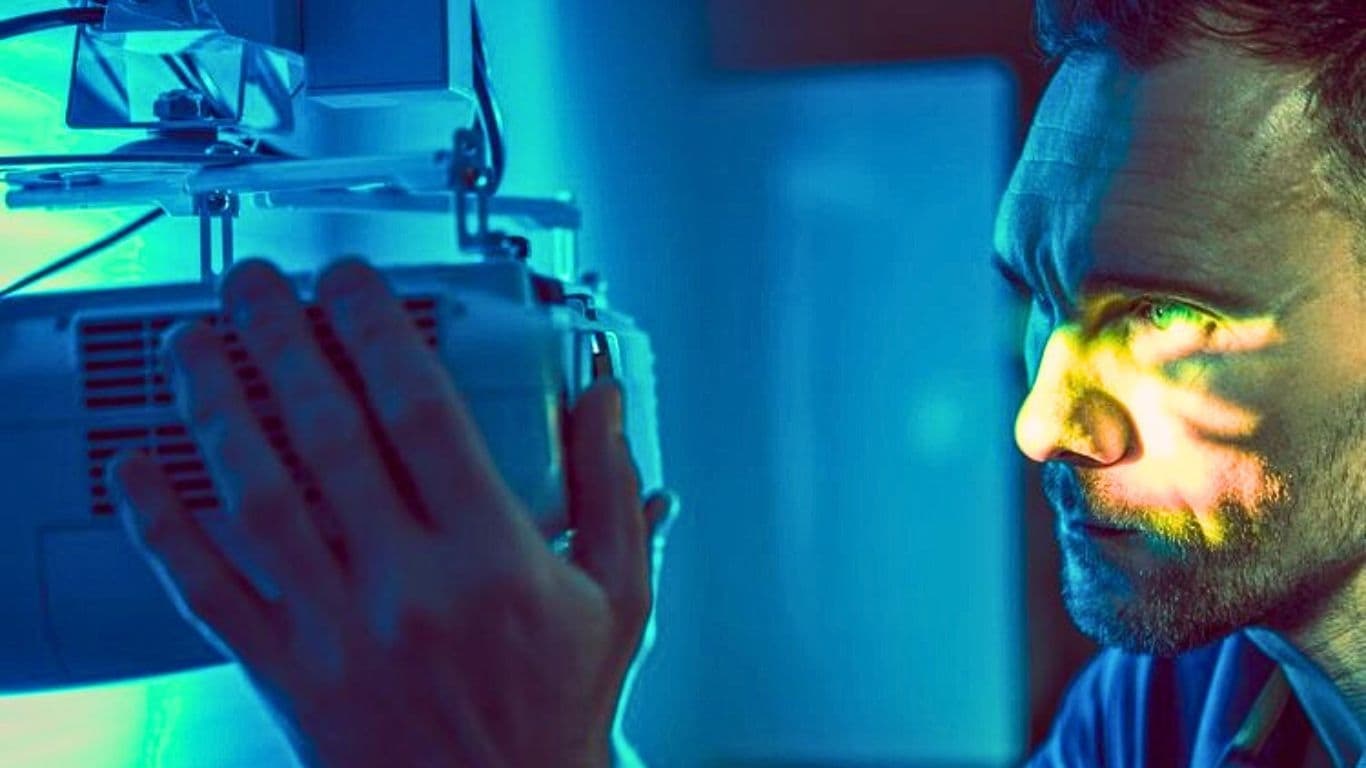

- Brightness and Intensity
Projectors emit intense light to create a visible image on a screen. Staring directly at a projector’s brightness, especially at close range, can lead to discomfort, and eye strain, and potentially damage the retina over time. The intensity of light can cause temporary glare and afterimages.
- Blue Light Emission
Many projectors, especially those using high-intensity lamps or LED technology, emit a significant amount of blue light. Blue light exposure, particularly in the evening or at night, can disrupt sleep patterns by suppressing melatonin production, leading to digital eye strain and potential long-term health concerns.
- UV Radiation
Some projector lamps may emit a small amount of ultraviolet (UV) radiation, which, if not adequately shielded, could contribute to eye damage, similar to the risks associated with excessive sun exposure.
- Flicker and Refresh Rate
Some projectors might exhibit flicker, especially at lower refresh rates. Prolonged exposure to flickering light can contribute to eye strain, headaches, and discomfort. You must know how many lumens are for outdoor projectors.
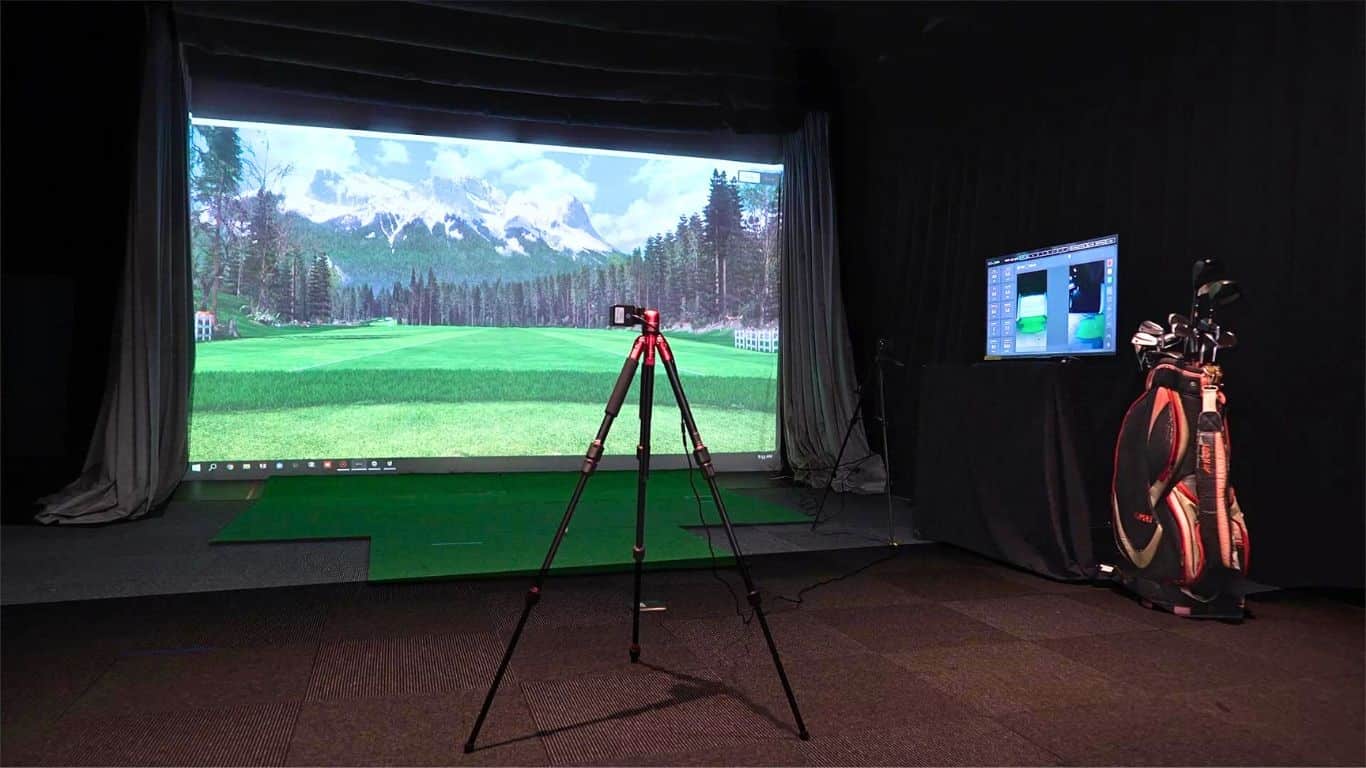

- Proper Usage and Precautions
To mitigate potential risks, it’s essential to follow safe usage guidelines. Sit at a comfortable distance from the best projector screen size, avoid staring directly into the light source, and take breaks to rest your eyes. Using projectors in a well-lit room and adjusting brightness settings can help reduce strain.
- Blue Light Filters and Screen Settings
Many projectors and devices offer blue light filters or settings that can reduce the amount of blue light emitted. These filters can help reduce potential eye strain and discomfort.
How to Protect Your Eyes When Using a Projector?
Protecting your eyes when using a projector involves adopting good practices and using appropriate tools to minimize eye strain and potential discomfort. Here are some tips to help you safeguard your eyes while using a projector:
Adjust Brightness and Contrast
Ensure that the projector’s brightness and contrast settings are optimized for the lighting conditions in the room. Avoid excessively bright settings that could cause glare and discomfort with the best projector screen material.
Control Ambient Lighting
Dim the ambient lighting in the room to reduce the contrast between the projected image and the surrounding environment. This can help minimize eye strain and improve visual comfort.
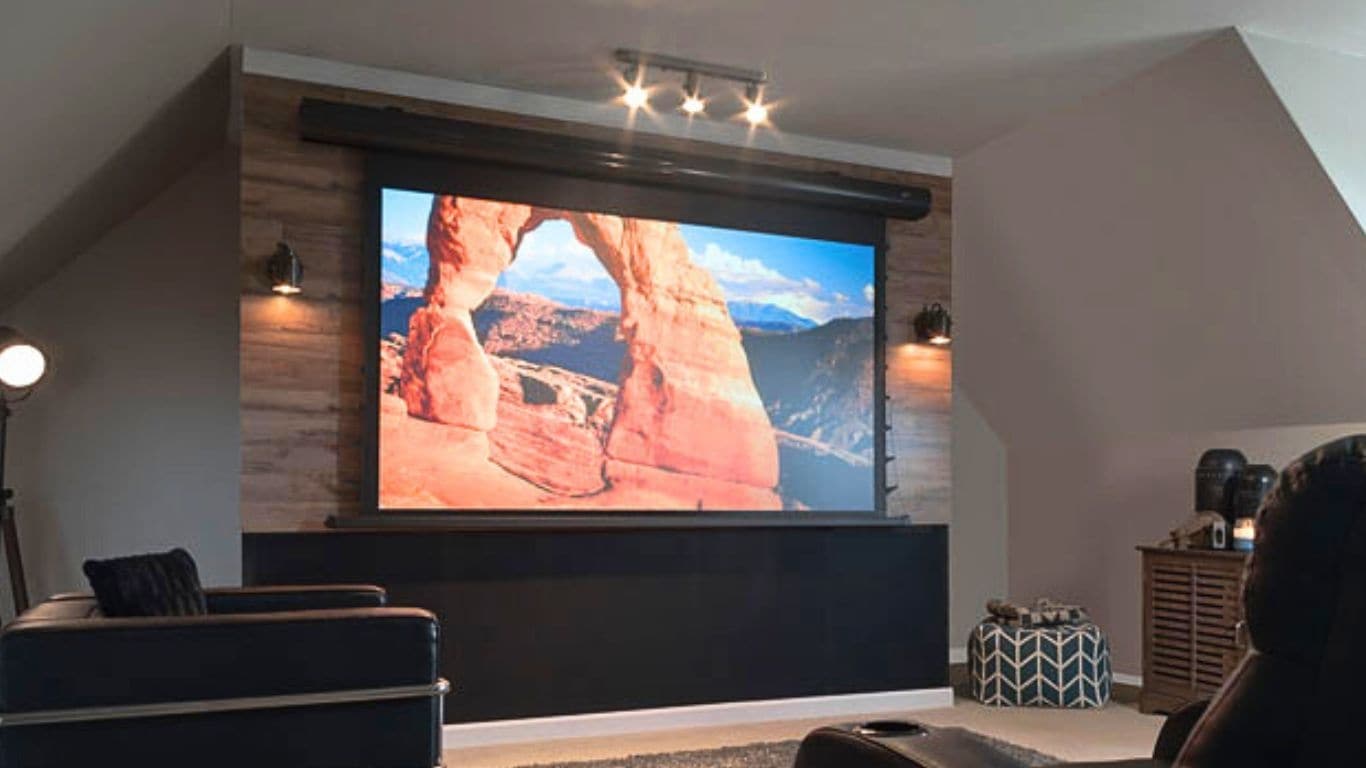

Use Blue Light Filters
Many projectors and devices offer blue light filter settings. Enable these filters to reduce the amount of blue light emitted, especially when using the projector in the evening or at night.
Maintain Proper Distance
Sit at a comfortable distance from the screen to avoid straining your eyes. The ideal distance depends on the screen size and resolution of the projector.
Take Breaks
Practice the 20-20-20 rule: Every 20 minutes, look at an object at least 20 feet away for at least 20 seconds. This helps reduce eye strain caused by prolonged focusing on a screen.
Adjust Screen Focus and Clarity
Ensure that the projected image is clear and in focus. Adjust the projector’s focus and screen resolution settings to avoid squinting or straining your eyes which decides the contrast ratio in a projector.
Proper Seating
Use ergonomic seating to maintain a comfortable posture and minimize neck and eye strain.
Position the Projector
Set up the projector so that the light is directed onto a surface (wall or screen) rather than directly into your eyes. Avoid placing the projector at eye level.
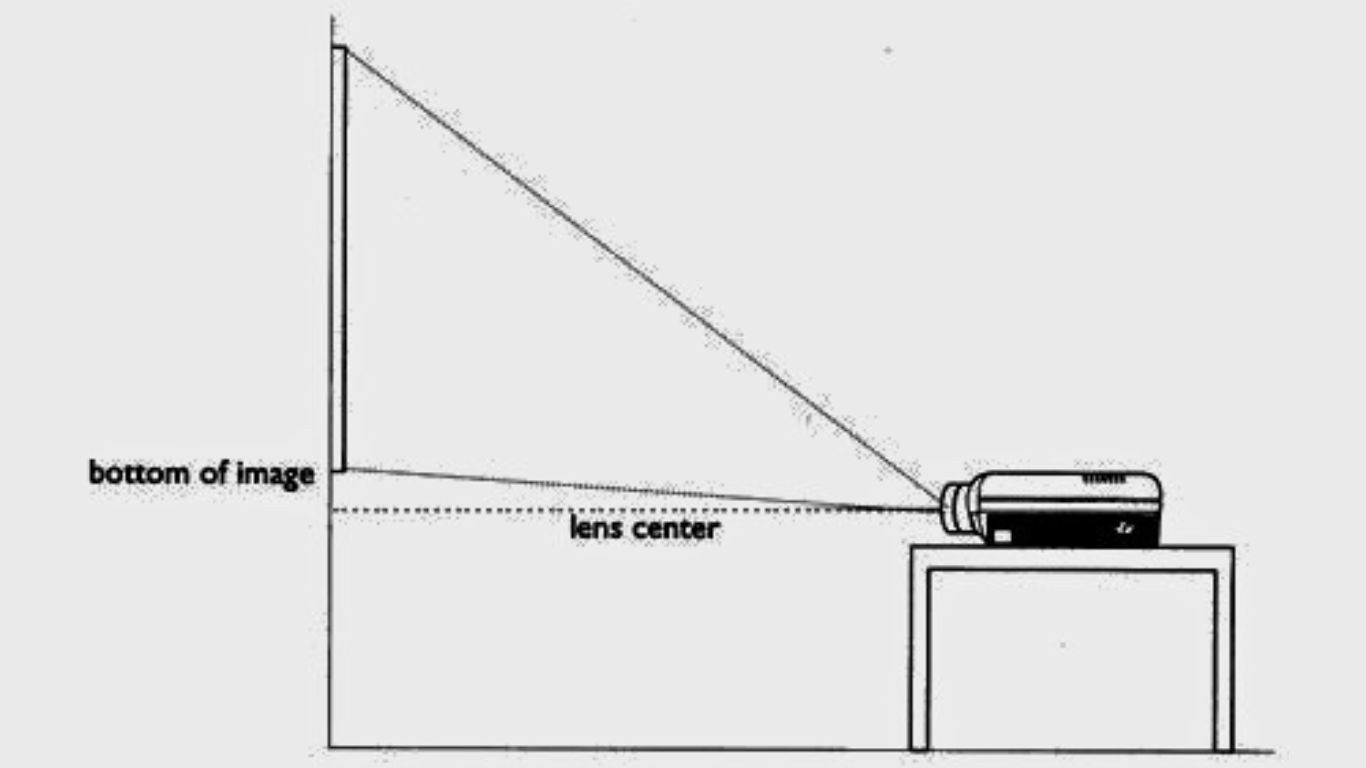

Stay Hydrated
Adequate hydration can help prevent dry eyes, which can be exacerbated by prolonged screen time. If using a projector for presentations, consider using anti-glare screens to reduce reflections and glare.
Blink Regularly
Remember to blink frequently to keep your eyes moisturized and prevent dryness.
Regular Eye Exams
Schedule regular eye exams to monitor your eye health and address any concerns.
Limit Usage Before Bed
Avoid using the projector, or any screen, close to bedtime as blue light exposure can disrupt sleep patterns.
Children and Projectors
When using projectors around children, ensure that they are at a safe distance and limit their screen time.
How can Laser Projectors Damage your Eyes?
Laser projectors have the potential to damage your eyes due to their intense and concentrated light output. The lasers used in these projectors emit coherent and focused light beams, which can pose risks if not used properly. Here’s how laser projectors can potentially harm your eyes:
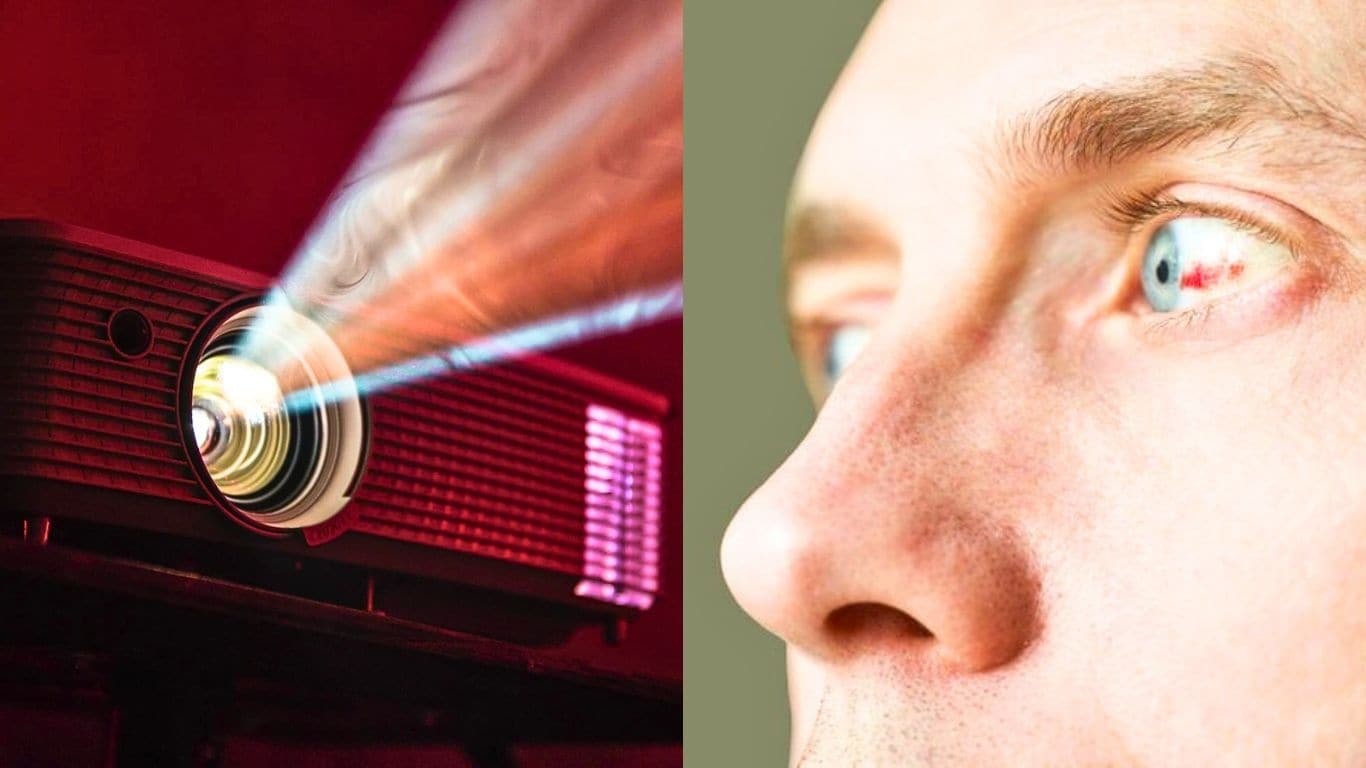

Direct Eye Exposure
Looking directly into the laser beam emitted by a laser projector, even briefly, can cause significant damage to the retina. The intense energy of the laser light can burn the sensitive retinal tissue and lead to permanent vision loss or impairment. ANSI Lumens Vs Lumens is the best option to choose a suitable projector.
Accidental Reflections
Laser beams are highly reflective and can bounce off surfaces in a manner that leads to accidental exposure. If a laser beam reflects off a surface and enters your eye, it can still cause damage to the retina, even if you weren’t looking directly at the projector.
Wavelength Sensitivity
Different wavelengths of laser light can affect the eye differently. Some wavelengths can be particularly harmful to the retina, leading to thermal damage or photochemical reactions that could impair vision.
Cumulative Exposure
Even low levels of laser light exposure over time can accumulate and cause damage. Prolonged or repeated exposure to laser projectors without adequate eye protection can increase the risk of eye injury.
Are Projectors Safe for Babies?
Projectors can be safe for babies by knowing, how projectors work when used appropriately and under controlled conditions. However, there are certain considerations to keep in mind to ensure the safety and well-being of infants:
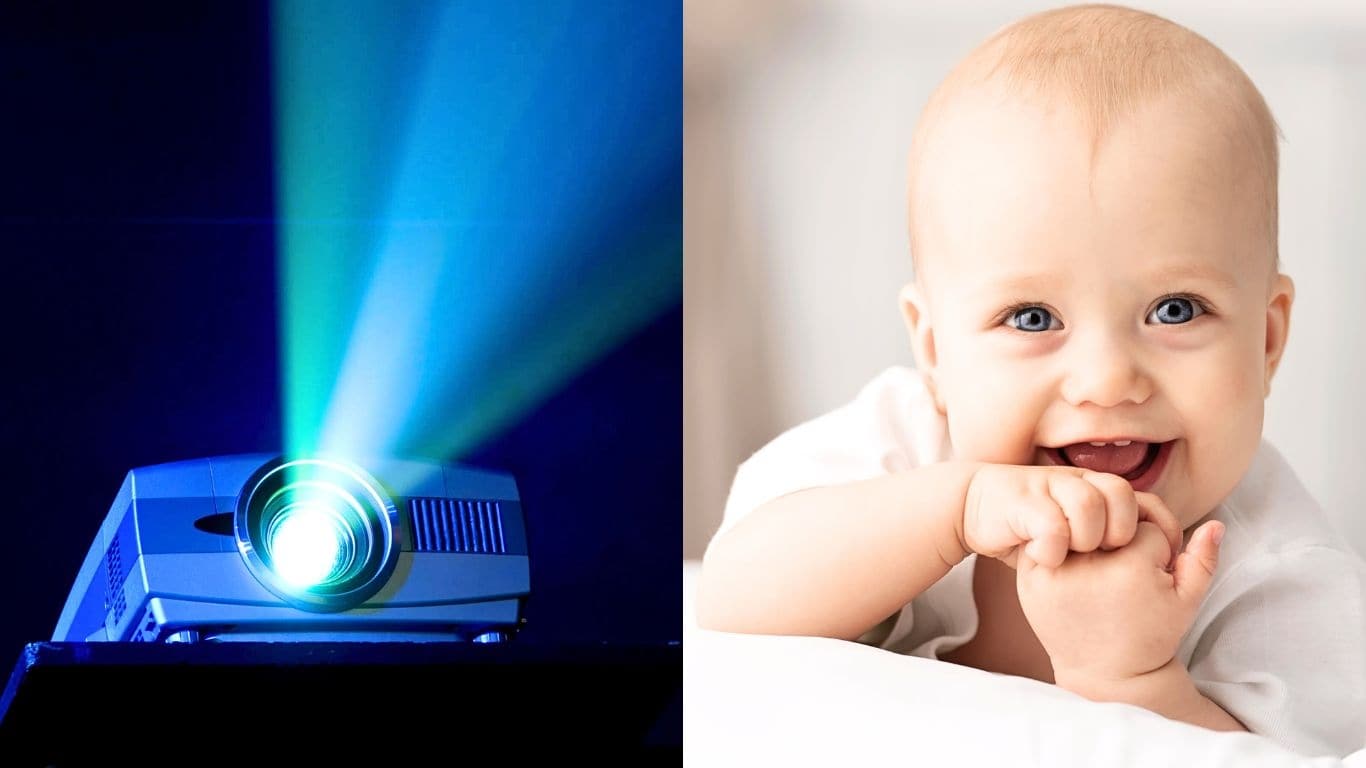

- Light Intensity and Duration
Babies’ eyes are sensitive and still developing. Bright or intense light, including projector light, can be uncomfortable or potentially harmful. It’s important to use projectors with adjustable brightness settings and avoid exposing babies to prolonged periods of direct light.
- Distance and Positioning
When using a projector around babies, ensure that the light source is not directed directly toward their eyes. Position the projector in a way that the light falls on a surface (such as a ceiling or wall) rather than into the baby’s eyes or detachable.
- Content and Stimulation
The content being projected should be suitable for babies’ cognitive development and not overly stimulating. Excessive visual stimulation, especially before bedtime, can disrupt their sleep patterns.
- Supervision
Always supervise babies when a projector is in use. Ensure they are at a safe distance from the projected light, and monitor their reactions to the light and imagery.
- Health Considerations
If your baby has any preexisting eye conditions, sensitivities, or health concerns, it’s advisable to consult a pediatrician before using a projector around them.
- Minimal Usage
While occasional and controlled usage of projectors for educational or calming purposes might be acceptable, it’s generally recommended to limit screen time for babies, including projector use, to promote healthy development.
Can a Projector Cause Cancer?
There is no substantial scientific evidence to suggest that projectors cause cancer. Projectors emit light, typically in the visible spectrum, to display images on a screen. The light emitted by projectors falls within the non-ionizing radiation category, which is generally considered to have lower energy levels and is not known to cause DNA damage that could lead to cancer.
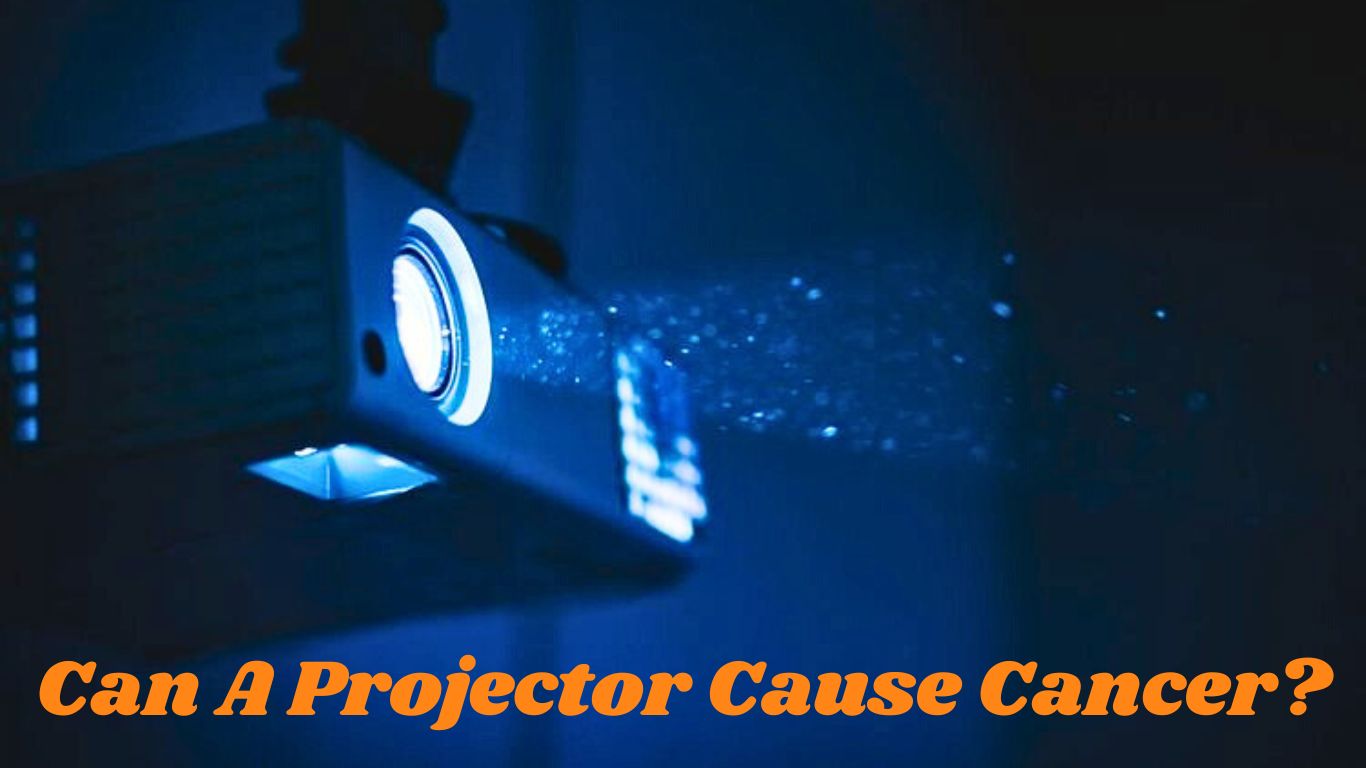

The concerns about cancer often center on ionizing radiation, which includes X-rays and certain types of ultraviolet (UV) radiation, due to their higher energy levels that can potentially disrupt cellular DNA. Best daylight Projectors do not emit ionizing radiation.
However, it’s important to note that technology and scientific understanding can evolve. New studies or findings could potentially shed more light on this topic. To stay well-informed, it’s a good practice to keep an eye on reputable sources of information, such as peer-reviewed scientific studies and health organizations.
If you have specific concerns or if you are using projectors extensively, it’s always a good idea to consult with medical professionals.
Are Projectors Better For Your Eyes – FAQs
Conclusion
This article provides valuable insights into the world of projectors and their impact on eye health, drawing from expert knowledge and experience. By knowing the benefits, precautions, and potential side effects of accidentally looking into a projector readers gain a comprehensive understanding of how to optimize their projector usage for both visual enjoyment and well-being.
Strike a balance on how to install projector screens in your home between the captivating allure of projectors and the well-being of your eyes. With a touch of mindfulness in your viewing habits, you can savor the grandeur of visuals while safeguarding the windows to your soul.
